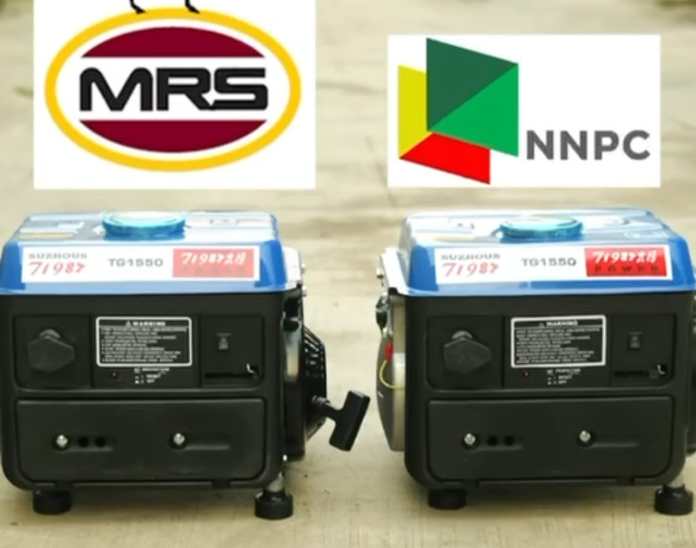News
MRS vs NNPCL? Fact-Check: What Is The Accuracy In Valor Reviews’ Experiment on Dangote vs NNPC’s Fuel?

Claim:
A content creator, Valor Reviews recently conducted an experiment comparing Dangote’s locally refined Premium Motor Spirit (PMS), sold at MRS fueling stations, with allegedly imported fuel from the Nigerian National Petroleum Company Limited (NNPCL).
It was observed that Valor Reviews is a YouTube channel and online platform that focuses on reviewing and analyzing various products, with a particular emphasis on technology, gadgets, and consumer electronics. The channel is known for its in-depth reviews, comparisons, and recommendations, helping consumers make informed decisions about their purchases. The platform is not known for delving into other sectors, like oil and gas in its reviews.
However, in the the experiment video the presenter in the video used two brand-new generators, added equal quantities of each fuel, and timed their operation until depletion. He claimed that one fuel burned 13 minutes faster than the other.
Verification:
A closer examination of the experiment’s methodology reveals critical flaws that undermine the reliability of its findings.
1. Lack of Transparency in Video Presentation
The experiment was showcased in an edited video rather than a live, uncut demonstration. Editing can conceal inconsistencies, raising suspicions that the results may have been manipulated rather than objectively observed.
2. Questionable Fuel Measurement Methodology
At 0:36 seconds into the video, the fuel levels in the containers appear unequal, and the fuels were not clearly labeled to differentiate them. Without confirming that precisely the same amount of fuel was used—ideally measured by weight to account for density variations—any comparison of burn rates is inherently flawed.
3. Why Volume Alone is an Inaccurate Measure
The energy content of a fuel is best measured by mass, as density can fluctuate due to temperature, composition, and even batch variations. The U.S. Energy Information Administration (EIA) that fuel energy content should be reported in terms of mass-based units to ensure accuracy. Similarly, ASTM D240, the Standard Test Method for Heat of Combustion of Liquid Hydrocarbon Fuels by Bomb Calorimeter, requires fuel samples to be weighed before testing to avoid density-related distortions.
By failing to measure fuel quantities based on weight, the experiment neglected a fundamental scientific principle in fuel efficiency comparisons.
4. Lack of Independent Oversight and Replication
The content creator acted as both the experimenter and the referee, with no independent verification or oversight. In scientific research, impartial replication by third parties is essential to eliminate bias. Without replication—such as running multiple trials or switching fuel sources between generators—the findings remain anecdotal and statistically unreliable.
5. Variability in Generator Performance
Even among brand-new generators of the same model, minor variations in carburetor calibration are common due to manufacturing tolerances and initial adjustments. These discrepancies can lead to different engine RPMs, affecting fuel consumption rates. As highlighted in technical guides and industry discussions, slight variations in throttle settings or idle speeds can cause one generator to burn fuel faster than another.
Thus, the claim that fuel quality alone caused a 13-minute difference is questionable without accounting for potential mechanical inconsistencies.
6. Absence of Laboratory Fuel Analysis
The experiment did not include an independent laboratory analysis to determine the chemical composition, additive levels, octane rating, and other quality parameters of the fuels used. Standard fuel quality assessments involve testing for flash point, density, viscosity, and sulfur content, among other factors. Without this verification, any observed differences in burn rate may simply reflect formulation variations rather than a genuine performance disparity.
7. NNPCL’s Response
In reaction to the viral video, NNPCL dismissed the claims that its PMS is substandard or burns faster than Dangote’s.
In a statement issued on Saturday, NNPCL’s Chief Corporate Communications Officer, Olufemi Soneye, described the experiment’s conclusions as baseless. He further clarified that a significant percentage of PMS sold at NNPCL retail outlets is actually sourced from the Dangote Refinery.
Conclusion:
Given the edited nature of the video, inconsistent fuel measurements, lack of independent oversight, potential differences in generator settings, absence of laboratory fuel analysis, and failure to replicate the experiment, the content creator’s claims are scientifically untenable.
Conclusively the methodology is flawed, riddled with bias, and lacks controlled variables, making the results misleading and unreliable.
Verdict: Misleading
PRNigeria
-
Society News4 years ago
Jamaican man beheads wife after finding out their 6 kids are not his
-
Society News6 years ago
EXCLUSIVE: The Complete Story of Dolapo Awosika, John Fashanu and Prophet Kasali Sex Mess
-
News5 years ago
Pastor Osagie Ize-Iyamu, His Membership Of Secret Cult, And Other Issues Touching On His Public Credentials Examined by Barr. PATRICK I. BIOSE
-
News5 years ago
BREAKING: Ajimobi’s daughter-in-law blast Gov. Makinde, says gov can’t surpass ex-Oyo gov
-
News5 years ago
BREAKING: 2 arrested as NAF begins investigations into Tolulope’s death
-
Crime5 years ago
Exclusive: Female Aide Fingered In Oko Oloyun’s Murder + Banking Transactions That Nailed Husband
-
Society News5 years ago
The Rise and Fall of “Jumoke The Bread Seller”
-
News5 years ago
BREAKING: Police take over Edo House of Assembly as APC, Oshiomhole move to seize control


You must be logged in to post a comment Login